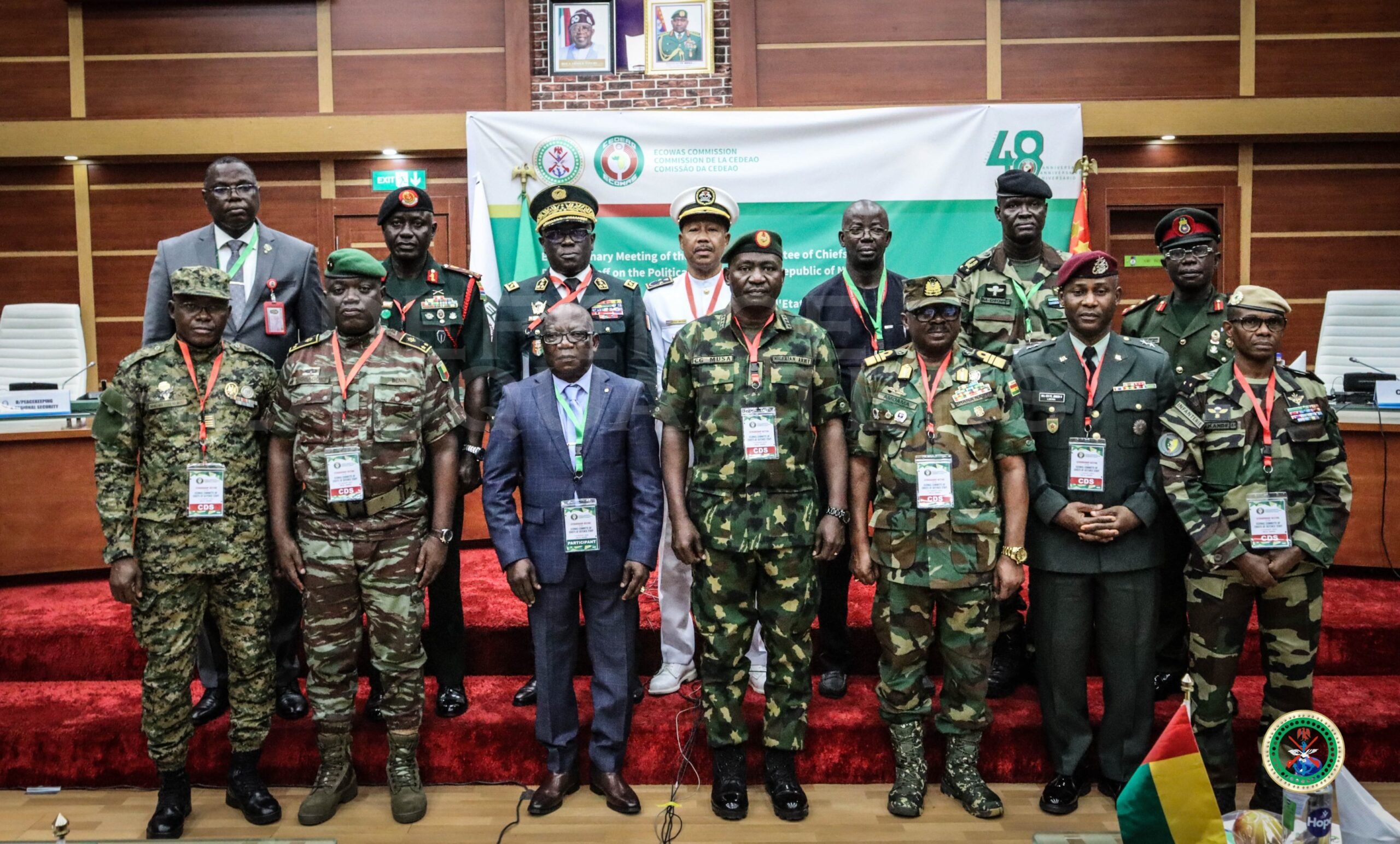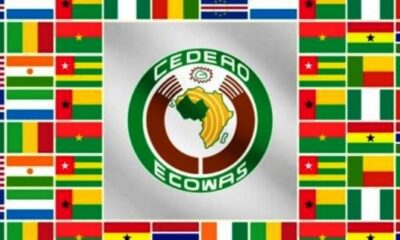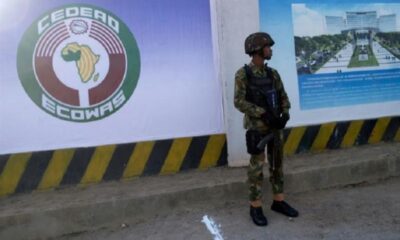Strictly Personal
Military action won’t resolve Niger crisis, By Solomon Ayele Dersso
Published
1 year agoon

No doubt, this is a major policy issue of immediate concern. But there is a more pressing aspect of the policy challenge the AU faces from the ECOWAS request for a wholesale endorsement of its decisions.
As the junta entrenches itself and gets more radical in an attempt to defy the sanctions and threat of force, and, on its part, Ecowas doubles down on its threat of force, the two are locking themselves on a dangerous path of escalation. If this is not reversed, it could degenerate into armed fighting. Such fighting is sure to frustrate the end state Ecowas seeks to accomplish through its planned military intervention — reinstating the deposed president to power, thereby reversing the coup and restoring constitutional order.
Yet the failure of the military intervention to achieve its end state would be the least consequential outcome. Unfortunately, the fighting that this intervention stands to precipitate is sure to accelerate the dangerous set of conditions set in motion that could blow up Niger, triggering calamitous consequences for the entire region and reverberating across the continent.
First, after the warning by the two other central Sahelian countries under military rule, Burkina Faso and Mali, that military measures against Niger amounts to a declaration of war against them, Ecowas’ military intervention in Niger risks to trigger regionalised war.
Second, with the announcement of the formation of a rebel movement aiming at reinstating President Bazoum to power, Niger faced the danger of internal fighting and hence the acceleration of its fragility.
Third, any military intervention that targets and weakens Niger’s army also exposes Niger to the danger of collapse. With an army battered by a fight with forces from neighbouring countries, Niger will easily be overrun by the armed terrorist groups operating in the Sahel.
Thus, the most pressing dilemma for the AU is to help Ecowas find a path for a non-military and non-punitive (for Nigerien people) resolution of the constitutional crisis in Niger and the attendant democratic setback it represents for the region.
For the West African region, the coup in Niger represented the case with the most significant regional and geostrategic implementations. It is the sixth coup to take place in the region since August 2020. Niger, one in five countries in the region is now under military rule.
However, more than any of the earlier cases, the coup in Niger sent shockwaves to many of the governments of the region. As an attack on a “democratically elected” government, it has triggered understandable concern for governments of the region that, if not reversed, no government in West Africa and beyond could remain immune from becoming a victim of a coup.
For Ecowas, which has been in the forefront of fighting coups, the occurrence of the coup in Niger puts the spotlight on the efficacy of how it handled the other coups.
It signals that the anti-coup posture and approach of Ecowas has lost all its potency and credibility – under the weight of elections with questionable credibility, prolongation of power by incumbents through tampering with constitutional provisions on term limits, erosion of civic space and worsening bad governance.
Coming not long after the ascent of Nigeria’s new president to the helm of Ecowas, the coup also came as a major foreign policy challenge for President Bola Ahmed Tinubu, who wishes to reaffirm the regional and continental leadership role of Nigeria.
When Ecowas set its first extraordinary summit after the coup, the mood on the part of political elites in West Africa was to send a strong message against the putsch in Niger for drawing a line on coups in the region. Indicating that they should have been firm in how they responded to earlier coups, Senegal President Macky Sall said “now that we are together on this, we should take action to make sure that it does not continue.”
Niger was thus slapped with the most severe regime sanctions that the regional body imposed “in the history of the region.” It closed air and land borders. It suspended financial and economic transactions with Niger.
Not surprisingly, President Tinubu’s administration took a tougher stance against the coup. In addition to the Ecowas sanctions, Nigeria cut power supply to Niger.
It is these measures that took centre stage in Ecowas effort to reverse the coup. As a follow up to the one-week ultimatum and to add pressure on the junta, on August 2-4 the Ecowas Committee of Chiefs of Defence met in Abuja to draw up a plan of military intervention.
With the space and the air sucked by the harshly punitive sanctions and the threat of military intervention, diplomacy ended up taking a very far secondary place. Indeed, the nature and scope of the sanctions and the ratcheting up of the threat of the use of force, instead of facilitating diplomacy, raised the stakes for both Niger and Ecowas.
While the sanctions exact heavy price and the threat of use of force puts Niger’s survival in peril, for Ecowas it is perceived, albeit wrongly, as a matter of its credibility per Cote d’Ivoire’s President Alassane Outtara.
Having exhausted all of its other ammunition at a go, Ecowas is left with military intervention as the only instrument of pressure. Not totally surprisingly, when the second extraordinary summit of Ecowas was convened on August 10, the regional body doubled down on its stance, including its threat to use force.
Thus, notwithstanding the admission of President Tinubu on the failure of the one-week ultimatum given to the junta, Ecowas, among others, decided to “immediately activate the Ecowas Standby Force with all its elements” and ordered, “the deployment of Ecowas Standby Force to Niger to restore constitutional order.” With all these, Ecowas has locked itself in a tight corner.
On the other hand, the harsh punitive sanctions and the use of force have given the junta the context for stirring the nationalist fervour of Nigeriens and riding on their anti-neo-colonial sentiments.
Ecowas’ position is made more difficult due to charges that it was being used to advance the interests of foreign powers in the face of the persistent diplomatic manoeuvring of France and until recently the US centred on securing the reinstatement of President Bazoum.
In the process, the junta has increasingly taken positions that are less amendable to diplomatic engagements. On August 3, a massive demonstration in support of the coup was staged. The Ecowas diplomatic delegation headed by former Nigerian President General Abdulsalami Abubakar sent on August 6, was prevented from leaving the Niamey airport and returned to Nigeria without meeting the coup leader.
On August 8, the junta declined to receive a tripartite delegation from Ecowas, AU and the UN, alleging that “anger and revolt among the population” against Ecowas’ sanctions made it impossible to guarantee the envoys’ safety. In the last few days, it was reported that the junta warned that it would kill the deposed president if military intervention is followed through.
All of the foregoing signals that Niger and Ecowas are on a war footing. The AU should rise to the occasion and mobilize robust diplomatic efforts aiming at helping Ecowas and Niger find a path that steers them clear of military intervention. This effort should include, as Joseph Sany, Vice-President of USIP rightly counselled, “avoiding military action that could worsen the crisis and shaping sanctions in ways to reduce suffering within the general population.”
The AU would fail to play a more responsible role if it took the easy option of reducing itself to rubber-stamping the decision of Ecowas despite all the risks.
Dr Solomon Ayele Dersso is the founding director of Amani Africa.
You may like
-


ECOWAS allocates $380m to electrify Nigerian health facilities
-


French journalist under watch by Mali, Burkina Faso, Niger juntas over jihadist analysis
-


ECOWAS President requests UNGA action on global pledges
-


Under their new coalition, Mali, Burkina, Niger to launch biometric passports
-


ECOWAS to fight terrorism with $4 million in subregion
-


ECOWAS fears disintegration if junta-led states leave
Strictly Personal
Budgets, budgeting and budget financing, By Sheriffdeen A. Tella, Ph.D.
Published
2 days agoon
November 20, 2024
The budget season is here again. It is an institutional and desirable annual ritual. Revenue collection and spending at the federal, State and local government levels must be authorised and guided by law. That is what budget is all about. A document containing the estimates of projected revenues from identified sources and the proposed expenditure for different sectors in the appropriate level of government. The last two weeks have seen the delivery of budget drafts to various Houses of Assembly and the promise that the federal government would present its draft budget to the National Assembly.
Do people still look forward to the budget presentation and the contents therein? I am not sure. Citizens have realised that these days, governments often spend money without reference to the approved budget. A governor can just wake up and direct that a police station be built in a location. With no allocation in the budget, the station will be completed in three months. The President can direct from his bathroom that 72 trailers of maize be distributed to the 36 states as palliatives. No budget provision, and no discussion by relevant committee or group.
We still operate with the military mentality. We operated too long under the military and of the five Presidents we have in this democracy, two of them were retired military Heads of State. Between them, they spent 16 years of 25 years of democratic governance. Hopefully, we are done with them physically but not mentally. Most present governors grew up largely under military regimes with the command system. That is why some see themselves as emperor and act accordingly. Their direct staff and commissioners are “Yes” men and women. There is need for disorientation.
The importance of budget in the art of governance cannot be overemphasized. It is one of the major functions of the legislature because without the consideration and authorisation of spending of funds by this arm of government, the executive has no power to start spending money. There is what we refer to as a budget cycle or stages. The budget drafting stage within the purview of the executive arm is the first stage and, followed by the authorisation stage where the legislature discusses, evaluates and tinkers with the draft for approval before presenting it to the President for his signature.
Thereafter, the budget enters the execution phase or cycle where programmes and projects are executed by the executive arm with the legislature carrying out oversight functions. Finally, we enter the auditing phase when the federal and State Auditors verify and report on the execution of the budgets. The report would normally be submitted to the Legislature. Many Auditor Generals have fallen victim at this stage for daring to query the executives on some aspects of the execution in their reports.
A new budget should contain the objectives and achievements of the preceding budget in the introduction as the foundation for the budget. More appropriately, a current budget derives its strength from a medium-term framework which also derives its strength from a national Development Plan or a State Plan. An approved National Plan does not exist currently, although the Plan launched by the Muhammadu Buhari administration is in the cooler. President Tinubu, who is acclaimed to be the architect of the Lagos State long-term Plan seems curiously, disillusioned with a national Plan.
Some States like Oyo and Kaduna, have long-term Plans that serve as the source of their annual budgets. Economists and policymakers see development plans as instruments of salvation for developing countries. Mike Obadan, the former Director General of the moribund Nigeria Centre for Economic and Management Administration, opined that a Plan in a developing country serves as an instrument to eradicate poverty, achieve high rates of economic growth and promote economic and social development.
The Nigerian development plans were on course until the adoption of the World Bank/IMF-inspired Structural Adjustment Programme in 1986 when the country and others that adopted the programme were forced to abandon such plan for short-term stabilisation policies in the name of a rolling plan. We have been rolling in the mud since that time. One is not surprised that the Tinubu administration is not looking at the Buhari Development Plan since the government is World Bank/IMF compliant. It was in the news last week that our President is an American asset and by extension, Nigeria’s policies must be defined by America which controls the Bretton Woods institutions.
A national Plan allows the citizens to monitor quantitatively, the projects and programmes being executed or to be executed by the government through the budgeting procedure. It is part of the definitive measures of transparency and accountability which most Nigerian governments do not cherish. So, you cannot pin your government down to anything.
Budgets these days hardly contain budget performance in terms of revenue, expenditure and other achievements like several schools, hospitals, small-scale enterprises, etc, that the government got involved in successfully and partially. These are the foundation for a new budget like items brought forward in accounting documents. The new budget should state the new reforms or transformations that would be taking place. Reforms like shifting from dominance of recurrent expenditure to capital expenditure; moving from the provision of basic needs programmes to industrialisation, and from reliance on foreign loans to dependence on domestic fund mobilisation for executing the budget.
That brings us to the issue of budget deficit and borrowing. When an economy is in recession, expansionary fiscal policy is recommended. That is, the government will need to spend more than it receives to pump prime the economy. If this is taken, Nigeria has always had a deficit budget, implying that we are always in economic recession. The fact is that even when we had a surplus in our balance of payment that made it possible to pay off our debts, we still had a deficit budget. We are so used to borrowing at the national level that stopping it will look like the collapse of the Nigerian state. The States have also followed the trend. Ordinarily, since States are largely dependent on the federal government for funds, they should promote balanced budget.
The States are like a schoolboy who depends on his parents for school fees and feeding allowance but goes about borrowing from classmates. Definitely, it is the parents that will surely pay the debt. The debt forgiveness mentality plays a major role in the process. Having enjoyed debt forgiveness in the past, the federal government is always in the credit market and does not caution the State governments in participating in the market. Our Presidents don’t feel ashamed when they are begging for debt forgiveness in international forum where issues on global development are being discussed. Not less than twice I have watched the countenance of some Presidents, even from Africa, while they looked at our president with disdain when issues of debt forgiveness for African countries was raised.
In most cases, the government, both at the federal and state cannot show the product of loans, except those lent by institutions like the World Bank or African Development Bank for specific projects which are monitored by the lending institutions. In other cases, the loans are stolen and transferred abroad while we are paying the loans. In some other cases, the loans are diverted to projects other than what the proposal stated. There was a case of loans obtained based on establishing an international car park in the border of the State but diverted to finance the election of a politician in the State. The politician eventually lost the election but the citizens of the State have to be taxed to pay the loan. Somebody as “Nigeria we hail thee”.
Transformation in budgeting should commence subsequently at the State and federal level. Now that local government will enjoy some financial autonomy and therefore budgeting process, they should be legally barred from contracting foreign loans. They have no business participating in the market. They should promote balanced budget where proposed expenditures must equal the expected revenues from federal and internal sources. The State government that cannot mobilise, from records, up to 40 percent of its total budget from IGR should not be supported to contract foreign loans. The States should engage in a balanced budget. The federal government budget should shift away from huge allocations to recurrent expenditure towards capital expenditure for capital formation and within the context of a welfarist state.
Sheriffdeen A. Tella, Ph.D.
Strictly Personal
African Union must ensure Sudan civilians are protected, By Joyce Banda
Published
4 weeks agoon
October 25, 2024
The war in Sudan presents the world – and Africa – with a test. This far, we have scored miserably. The international community has failed the people of Sudan. Collectively, we have chosen to systematically ignore and sacrifice the Sudanese people’s suffering in preference of our interests.
For 18 months, the Rapid Support Forces (RSF) and the Sudanese Armed Forces (SAF) have fought a pitiless conflict that has killed thousands, displaced millions, and triggered the world’s largest hunger crisis.
Crimes against humanity and war crimes have been committed by both parties to the conflict. Sexual and gender-based violence are at epidemic levels. The RSF has perpetrated a wave of ethnically motivated violence in Darfur. Starvation has been used as a weapon of war: The SAF has carried out airstrikes that deliberately target civilians and civilian infrastructure.
The plight of children is of deep concern to me. They have been killed, maimed, and forced to serve as soldiers. More than 14 million have been displaced, the world’s largest displacement of children. Millions more haven’t gone to school since the fighting broke out. Girls are at the highest risk of child marriage and gender-based violence. We are looking at a child protection crisis of frightful proportions.
In many of my international engagements, the women of Sudan have raised their concerns about the world’s non-commitment to bring about peace in Sudan.
I write with a simple message. We cannot delay any longer. The suffering cannot be allowed to continue or to become a secondary concern to the frustrating search for a political solution between the belligerents. The international community must come together and adopt urgent measures to protect Sudanese civilians.
Last month, the UN’s Independent International Fact-Finding Mission for Sudan released a report that described a horrific range of crimes committed by the RSF and SAF. The report makes for chilling reading. The UN investigators concluded that the gravity of its findings required a concerted plan to safeguard the lives of Sudanese people in the line of fire.
“Given the failure of the warring parties to spare civilians, an independent and impartial force with a mandate to safeguard civilians must be deployed without delay,” said Mohamed Chande Othman, chair of the Fact-Finding Mission and former Chief Justice of Tanzania.
We must respond to this call with urgency.
A special responsibility resides with the African Union, in particular the AU Commission, which received a request on June 21 from the AU Peace and Security Council (PSC) “to investigate and make recommendations to the PSC on practical measures to be undertaken for the protection of civilians.”
So far, we have heard nothing.
The time is now for the AU to act boldly and swiftly, even in the absence of a ceasefire, to advance robust civilian protection measures.
A physical protective presence, even one with a limited mandate, must be proposed, in line with the recommendation of the UN Fact-Finding Mission. The AU should press the parties to the conflict, particularly the Sudanese government, to invite the protective mission to enter Sudan to do its work free from interference.
The AU can recommend that the protection mission adopt targeted strategies operations, demarcated safe zones, and humanitarian corridors – to protect civilians and ensure safe, unhindered, and adequate access to humanitarian aid.
The protection mission mandate can include data gathering, monitoring, and early warning systems. It can play a role in ending the telecom blackout that has been a troubling feature of the war. The mission can support community-led efforts for self-protection, working closely with Sudan’s inspiring mutual-aid network of Emergency Response Rooms. It can engage and support localised peace efforts, contributing to community-level ceasefire and peacebuilding work.
I do not pretend that establishing a protection mission in Sudan will be easy. But the scale of Sudan’s crisis, the intransigence of the warring parties, and the clear and consistent demands from Sudanese civilians and civil society demand that we take action.
Many will be dismissive. It is true that numerous bureaucratic, institutional, and political obstacles stand in our way. But we must not be deterred.
Will we stand by as Sudan suffers mass atrocities, disease, famine, rape, mass displacement, and societal disintegration? Will we watch as the crisis in Africa’s third largest country spills outside of its borders and sets back the entire region?
Africa and the world have been given a test. I pray that we pass it.
Dr Joyce Banda is a former president of the Republic of Malawi.
EDITOR’S PICK


Ghana partners with The Gambia to provide free roaming services
Ghana and The Gambia are in the process of launching free roaming services that will enhance a West African connectivity....


Zambia: APP leader lampoons PF over pledge to reverse forfeited properties
Leader of one of Zambia’s opposition parties, Advocates for People’s Prosperity (APP), Mwenye Musenge, has criticised the Patriotic Front (PF)...


Ghanaian winger Fatawu out for season with ACL injury
Ghana and Leicester City winger, Abdul Fatawu, has been ruled out of the rest of the EPL season after suffering...


DRC authorities arrest six over break-in at Lumumba’s Mausoleum
Police in the Democratic Republic of Congo (DRC) say six people have been arrested over a break-in and vandalism at...


Finnish court imprisons Nigeria’s Simon Ekpa for aiding terrorism
Simon Ekpa, a Nigerian separatist leader based abroad, has been placed under detention by the Päijät Häme District Court...


Nigerian Senate confirms influx of terrorists from Mali, Burkina Faso into the country
The Nigerian Senate has raised the alarm over the influx of terrorists from Mali and Burkina Faso who operate in...


Tanzania to host 6th Ocean Innovation Africa summit in February
Dar es Salaam, Tanzania, has been selected to host the sixth edition of the Ocean Innovation Africa (OIA) summit from...


Miss SA opens up on why she withdrew from Miss Universe pageant
Reigning Miss South Africa 2024, Mia le Roux, has opened up on the reasons behind her withdrawal from the Miss...


SA football legend Lucas ‘Masterpieces’ Moripe passes away
South African football legend, Lucas “Masterpieces” Moripe, has passed away at the age of 71 after a long battle with...


Wanted Zambian MP who escaped from prison custody captured in Harare
A fugitive Zambian Member of Parliament (MP), Emmanuel Banda, who escaped from custody at the Chipata Prison in Eastern Province...
Trending
-

 Metro1 day ago
Metro1 day agoWanted Zambian MP who escaped from prison custody captured in Harare
-

 Sports1 day ago
Sports1 day agoSA football legend Lucas ‘Masterpieces’ Moripe passes away
-

 Culture1 day ago
Culture1 day agoMiss SA opens up on why she withdrew from Miss Universe pageant
-

 Politics1 day ago
Politics1 day agoUgandan opposition politician abducted, wife says


